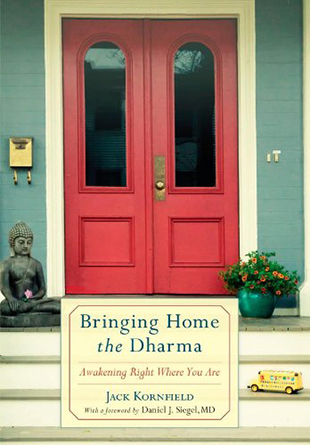Jack Kornfield is a Buddhist writer and teacher who practices Insight Meditation and is cofounder of the Insight Meditation Center in Barre, Massachusetts and of Spirit Rock Meditation Center in Woodacre, California. He is profiled at S&P as one of our Living Spiritual Teachers.
Buddha had a message which he gave to all he met. What was it? In the introduction to this collection of essays Kornfield writes:
"All aspects of your life are your field of practice, the precise place to find freedom and compassion. From politics and parenting to meditation and education, from sex and drugs to poetry and art, every part of your life is sacred. This very life, your work, your family, your community is the only place for awakening. In Zen this is called 'no part left out.' "
For more than 40 years Kornfield has been practicing this way, and what he has come up with constitutes a path of everyday spirituality. The author sees mindfulness as having four foundations: body, feelings, mind, and dharma. This tool enables us to open and let go rather than struggle and cling to things or people. In a chapter titled "Realizing Our Full Potential: Cultivating Love and Joy," Kornfield tells a few inspiring stories about one of his favorite spiritual teachers, Dipa Ma, a grandmother and householder in Calcutta, India. This skilled meditator was able to see clearly and to walk the teachings of generosity and compassion in her daily life.
A spiritual practice that comes up regularly in the books we review is forgiveness. Kornfield takes a crack at it by noting:
• "Forgiveness is not weak or naïve.
• Forgiveness does not happen quickly.
• Forgiveness does not forget, nor does it condone the past.
• Forgiveness does not mean that we have to continue to relate to those who have done us harm."
Kornfield hits the mark in his essay on the qualities of spiritual maturity: non-idealism, kindness, patience, immediacy, integrated and personal, open-mindedness, flexibility, embracing opposites, relatedness, and ordinariness. Many of these qualities are evident in Kornfield's life and writings.
The last sections of Bringing Home the Dharma revolve around lessons from modern masters (Ajahn Chah amd Chogyam Trungpa), commentary on the dharma in the West (gurus, drugs, sex, and enlightenments), and practices (meditation, forgiveness, loving-kindness). Kornfield, as usual, sparks serious thought in us as he dives deeply into the profound Buddhist teachings explored in this excellent book.
